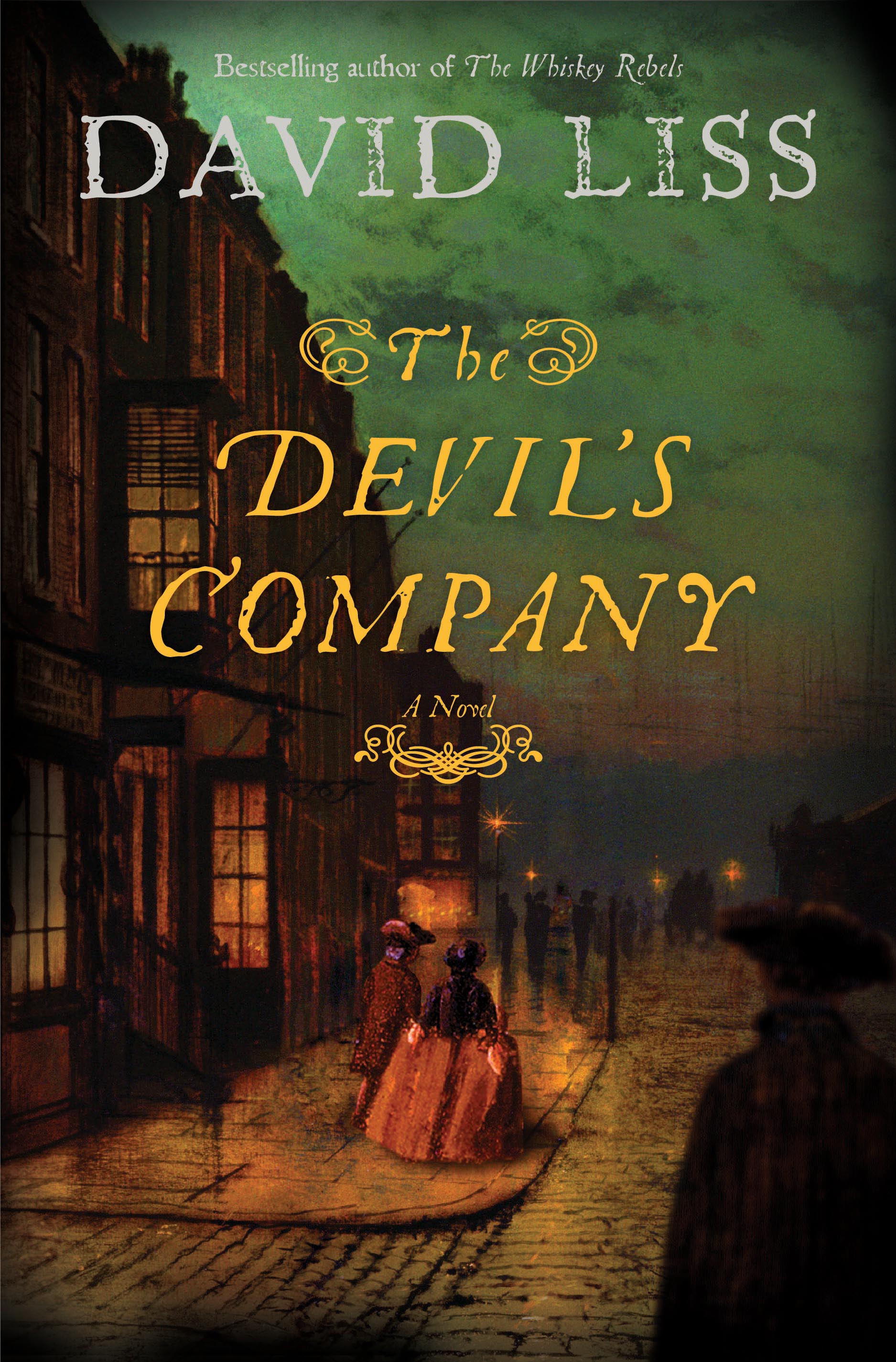
You are currently browsing the blog archives
for July, 2009.
Archives
Blogroll
|
Archive for July, 2009
Tuesday, July 7th, 2009
Hey, it’s publication day for The Devil’s Company. “Liss keeps the suspense at full boil and the action rolling swiftly ahead,” says Publisher’s Weekly; “An
engaging, intelligent and entertaining narrative,” says The San Antonio Express News; ” Witty and stimulating entertainment,” says Kirkus Reviews; “Mr. Liss has written a superlative book,” says a guy on Barnes & Noble.com who snagged an advance copy. |
 |
| Buy Me |
Buy one today at Amazon, Barnes & Noble, your favorite independent or all three if you can’t choose. You can also buy it on that marvelous device, the Kindle.
At least I’m told it is marvelous. I don’t, you know, have one myself. But I
would like one, Amazon. Makes a nice publication day gift, don’t you think? |
 |
| You will love this novel the way deer love bunnies |
And what about the whole simultaneity thing? It’s actually become a running
gag with my publisher. Think about it. 2000, I publish A Conspiracy of Paper,
about a major stock market melt-down, just as the internet bubble is imploding.
Last year I publish The Whiskey Rebels, about the first financial meltdown in
American history right when we are undergoing our own special, modern economic
freakout. And now here comes The Devil’s Company, about a corporate giant that is confronting the disastrous reality that it can’t do business the way it
always has before (think GM and Chrysler). Spooky. In other news, there’s a new interview with me at American Chronicle. This is part of my “virtual book tour” – way more fun than traveling to great cities, staying in nice hotels, and ordering room service. There’s also a nice review on Matt Rees’s blog. Check it out, as well as Matt’s interview with me, and more info on his own excellent books, which you should read — after you read mine. |
Posted in Uncategorized | 1 Comment »
Monday, July 6th, 2009
Unlike Alice Hoffman’s new novel (see blog post from June 29th), The Devil’s Company (on sale July 7th! That’s tomorrow!) received very favorable treatment from my hometown newspaper, The San Antonio Express News. Reviewer David Hendricks says “The Devil’s Company,” like [A Conspiracy of Paper] and [The Whiskey Rebels] is more than just a finely written mystery. Liss injects thoughtful discussion of issues that should resonate in the best university business courses. Corporate ethics at the British East India Company appear to resemble those of Wall Street companies this decade…. Liss accomplishes this within an engaging, intelligent and entertaining narrative that also illuminates London’s 18th-century lifestyles and urban landscapes. The dialogue is sharply turned, and the humor is deliciously subtle.” For more about how swell the new book is, read the entire review here. As a bonus, Hendricks manages to make it through an entire article without talking about how much he hates The Ethical Assassin. I’m pleased to see he is moving on. For his sake.
But this was not the only one I received this weekend. Ever since Vikings founded the city of Houston in the late 8th century, no institution has expressed its opinions and culture as consistently as Examiner.com. It was there that Faith Acker, on our nation’s birthday, chose to post a review of my first novel, a mere nine and half years after its publication. She calls her work, “Liss’ A Conspiracy of Paper: A Conspiracy of Pompus Drivel. Perhaps not the best thing to read to learn the correct spelling of the word pompous, it is a pretty good essay if you want to know how much this woman hates my first book.
 Hjalnek, founder of Houston Since it has been a busy time for writers striking back at their reviewers (see blog posts from June 29th and July 2nd), I thought I might say a few words about Ms. Acker’s analysis of my work. In may ways, I sympathize with Alice Hoffman and Alain de Botton in their rage against what they perceive as unfair reviews. I, myself, have received what I thought of as unfair reviews, and they are pretty annoying. But Ms. Acker’s piece is not the sort of review you get in a newspaper or magazine which actually attempts to provide some kind of thoughtful analysis (perhaps incorrectly) of where a book has gone wrong. Certainly, I respect the right of people to not like a book by me – or anyone else. Taste is a mysterious thing, and novels are rarely good or bad in any empirical sense.
What bothers me about this review is that it is more like the kind of unhinged email I get once in a while from readers who are clearly furious with me for having written a book they did not like. Some readers take the existence of a book they don’t enjoy as a personal insult. That appears to be the case here. Of Benjamin Weaver, the novel’s protagonist, whom many readers actually like, Acker writes, “Liss has created a loathsome and wordy imbecile to write this interminable first-person narrative…. Overall, the book’s narrator writes in the tone of a bad bully who can’t understand why his attempts at humour [sic – though only in America] are overlooked by his victims, and it is, indeed, the reader rather than Weaver’s opponents who most suffer at the hands of this poor excuse for a protagonist.”
 Faith Acker, from her profile Ouchie. She has hurt my feelings. Acker provides no email address, but you can leave comments after the post. I am not suggesting anything. I’m just, you know, saying.
Posted in Uncategorized | 4 Comments »
Friday, July 3rd, 2009
My goal, of course, is to keep the hundreds of thousands of you who follow my blog up to date with my reading, but since this is the first time I’ve posted book reviews, I think it best to establish that I am not going to review everything I read. Much of what I read is for research, and so boring that even mentioning the titles could harm you. I spend a lot of my reading time with manuscripts and galleys, offering up advance comments and giving back to the writerly community that has given so much to me. And finally, I won’t post bad reviews of fiction, and I will only post bad reviews of non-fiction if there is something about it that pisses me off. So, the bottom line is that I will mostly be telling you about the book I like.
Also, if you are strapped for cash, make sure you ignore my recommendations and instead buy The Devil’s Company (on sale July 7th!) and The Whiskey Rebels (now in paperback!). It’s important to prioritize.
 Donna Tartt: The Little Friend. This is one I’ve been meaning to read for years. I loved (as did just about everyone who read it) Tartt’s first novel, The Secret History, but I never quote got around to her second book, in part because of what was, as I recall, a somewhat lukewarm reception. I can now officially say the lukewarmity was totally undeserved, stemming from a sense of disappointment, I believe, that Tartt did not write the same kind of novel the second time around. The Little Friend is a very different book, but a brilliant one in its own right. Imagine a bizarre mash-up for Stephen King at his most controlled best and Flannery O’Connor at her southern gothic creepiest. Donna Tartt: The Little Friend. This is one I’ve been meaning to read for years. I loved (as did just about everyone who read it) Tartt’s first novel, The Secret History, but I never quote got around to her second book, in part because of what was, as I recall, a somewhat lukewarm reception. I can now officially say the lukewarmity was totally undeserved, stemming from a sense of disappointment, I believe, that Tartt did not write the same kind of novel the second time around. The Little Friend is a very different book, but a brilliant one in its own right. Imagine a bizarre mash-up for Stephen King at his most controlled best and Flannery O’Connor at her southern gothic creepiest.
The Little Friend is, ostensibly, about a precocious and damaged 12-year-old girl who sets out to uncover the mystery of her brother’s brutal murder, which happened when she was an infant. It is not a mystery novel, however, and readers in search of hard-core plot resolution will almost certainly be disappointed. Rather than focus on who done it, Tartt concerns herself with a couple of very differently messed up families and the stories people tell themselves to understand their own lives. Make no mistake, this is a compelling, page-turning, suspenseful novel. It just doesn’t go for the easy answers.
And to cover some things I’ve already read but deserve mention….  I am also one of the bloggers over at Contemporary Nomad, and I’ve been trying to catch up with the books of fellow ContNoms, as we often call ourselves. Two books I must recommend are The Tourist by Olen Steinhauer and For the Dogs by Kevin Wignall. I met Olen when I was in Italy a couple months ago, and we creepily became friends instantly even though his wife hates me. Hates me. The Tourist is a perfectly executed spy thriller, compelling and very smart. It’s the real deal. I’ve never met Kevin, but via email he seems like an all around good guy. For the Dogs is a voice-driven, devour-in-one-sitting thriller about a retired hit man and the strange relationship he develops with a woman he has been hired to protect. Both of these writers have several other books which I have not yet gotten to, but you should. After you buy mine. I am also one of the bloggers over at Contemporary Nomad, and I’ve been trying to catch up with the books of fellow ContNoms, as we often call ourselves. Two books I must recommend are The Tourist by Olen Steinhauer and For the Dogs by Kevin Wignall. I met Olen when I was in Italy a couple months ago, and we creepily became friends instantly even though his wife hates me. Hates me. The Tourist is a perfectly executed spy thriller, compelling and very smart. It’s the real deal. I’ve never met Kevin, but via email he seems like an all around good guy. For the Dogs is a voice-driven, devour-in-one-sitting thriller about a retired hit man and the strange relationship he develops with a woman he has been hired to protect. Both of these writers have several other books which I have not yet gotten to, but you should. After you buy mine.
Posted in Uncategorized | 3 Comments »
Thursday, July 2nd, 2009
 He said mostly nice things -- but is that enough?
The staff here at davidliss.com is still trying to find a picture of the late Karl Malden reading his advance copy of The Devil’s Company (on sale July 7th!) In the meantime, here is another nice review, this time from Booklist.
Liss’ third Benjamin Weaver novel finds the eighteenth-century British “thief-taker” (a kind of detective specializing in recovering stolen goods) on the wrong end of an elaborate scam. A secretive businessman, Mr. Cobb, has bought the debts of Weaver’s uncle and two friends and threatens to throw them all into debtors’ prison if Weaver doesn’t do his bidding: gather information that could be used against London’s formidable East India Company. Reluctantly, Weaver is on the case, but his real agenda is to save his friends and use whatever information he uncovers against Cobb and his henchmen. As in the previous Weaver adventures, A Conspiracy of Paper (2000), about Exchange Alley, center of the eighteenth-century British stock trading, and A Spectacle of Corruption (2004), about the world of bare-knuckle politics, Liss probes another insular community, silk traders, whose tentacles extend deep into every fabric of British economic and social life. His portrait of the East India Company could stand as a treatise on the birth of today’s megacorporation: rife with historical detail and philosophical rumination on the proper relationship between business and government, it offers context on issues that continue to fuel debate on both sides of the Atlantic, but it does so not with pontificating economists but with a cast of robust Dickensian characters who wear their individuality on their silky sleeves…. For every English major who flunked economics, Liss is here to complete our education in a way we can understand.— Bill Ott
I’ve taken the liberty of redacting the reviewer’s one negative comment. You don’t need to know about it. But in light of my recent comments on Alice Hoffman Tweeting her detractors into oblivion (see my June 29th post), I am willing to supply reviewer Bill Ott’s email address to anyone who wants to tell him off for daring to speak ill, however slightly, of anything I’ve done. Just email us, and one of the friendly staffers here at davidliss.com will get right back to you.
These are, after all, dangerous times to be disrespecting a writer in print. You got Alice Hoffman’s freak out, which has already turned her name into a verb and an adverb (e.g., “I’ll Hoffman you” and “You have responded to my review most Hoffmanfully”). Now there’s the story of Caleb Crain’s New York Times review of Alain de Botton’s Pleasures and Sorrows of Work. Crain (full disclosure time – I went to grad school with him and think him an all around swell guy) wrote a pretty harsh review, and then de Botton blasted back rather Hoffmanfully on Crain’s blog. “I will hate you till the day I die,” the angry writer Hoffmans, “and wish you nothing but ill will in every career move you make.” For even yet still more on this unfolding story, check out this article on Bookseller.com. In the meantime, with The Devil’s Company to be on the shelves soon (July 7th!), I say reviewers, be careful.
 I found this on the internet. I didn't even have to look very hard. Also, here’s a picture of a cat I don’t know sitting on a Kindle that is not mine. If Amazon would send me a free Kindle (I’d like the DX, please), I would also let my cat use it. Unless they don’t want me to.
Posted in Uncategorized | Comments Off on
Wednesday, July 1st, 2009
The emails I receive from many readers all over the world (and sometimes even
further!) often ask me for my opinions about books, films and music, so I
thought it would be a good idea to include such reviews in my blog. Otherwise I
may run out of things to say.
Under development as a Hollywood movie. Does it make me a cynic to assume it will suck? |
|
I’d heard good things about the BBC miniseries Lost in Austen, so I manfully set aside my manly disregard for romantic comedies and checked it out. I have to say it was awesome. No, really. Clever, funny, and totally satisfying. I also appreciate that it assumes a complete working knowledge of Pride and Prejudice (which I have because I am manly and sensitive), and it doesn’t waste any time bringing the viewer up tospeed. If you only have a passing recollection of the novel, then this DVD is not for you. If, on the othe hand, you can name all five Bennet sisters without hesitation, can recall the names of both Bingley’s and Darcy’s estates (special bonus points if you can name Lady Catherine’s — no internet cheating) then come on in, my friend. You are most welcome.Yes, the premise is silly, and the first few minutes of the film are almost too dippy to be endured, but once you get past the opening moves, everything clicks into place. The idea is that a Amanda, a young woman obsessed with Pride and Prejudice, somehow changes places with Elizabeth Bennet. It’s one of those vague moves you can get away with in television and film, but novelists would be nailed to the wall for attempting. This is my moment of resentment. In any case, while Elizabeth is off somewhere in modern day London, Amanda has to take her place in the world of P&P, trying to fit in, what with her modern ways and all, and working hard to keep the novelistic events rolling along the way they are supposed to.
The main thing here is that the writing is consistently and remarkably witty. British TV writer Guy Andrews knows and gets the material, and even the most cartoonish characters in Austen are rendered with sensitivity and insight. Indeed, some of the character revisions are very learned and so satisfying. And this is not a cheeky romp through a set narrative. Amanda’s incursion in the fiction world changes the characters around her, and they don’t do, say, or even marry the way they do in the novel. It all has a very playful feel – in fact, when, in one hilarious sequence Amanda asks one of the characters to act out a scene from the famous BBC production of P&P, she says, “This is very post-modern.” Indeed.
And what better way to enjoy a BBC comedy about Jane Austen than with a nice Valpolicella? I went with the 2006 Zenato Valpolicella Superiore Ripassa. I had high hopes for this one. Robert Parker gave it a 93, and while a 90+ rating from Parker doesn’t mean what it used to (he’s handing them out like crazy for over-extracted Australian swill), it still seemed like a good indicator. The thing is, if you check the on-line wine boards, you see two completely different descriptions of this wine. Some tasters report a big, jammy monster. Others a more subdued and subtle juice. Curious.
My experience was the latter. I found the nose to be very muted, but after breathing out of the glass like an asthmatic with his inhaler, I could get berry, date, a touch of banana cream pie, and a blast of vanilla. The mouthfeel was a bit thin, almost watery at times, but in the end I pronounced it medium-bodied with very nicely balanced tannins and acidity. I didn’t get any jamminess, but there was dark fruit, especially blackberry, fig, and prune and also a hint of diluted latte. Make no mistake, this is a very enjoyable wine, but I was expecting something bigger and bolder. Knocking ten buck off the price would probably have inspired me to add another point or two,
but at almost $30 a bottle, I want something a little more dynamic. I gave it an 88.
You can follow my hard-drinking, hard-living lifestyle on my CellarTracker! page, where I post all my wine info. |
Jane Austen taught men to attract women by being jerky and rich.  |
Elliot Cowan gets all Colin Firthy |
 |
Posted in Uncategorized | Comments Off on
|







 Donna Tartt: The Little Friend. This is one I’ve been meaning to read for years. I loved (as did just about everyone who read it) Tartt’s first novel, The Secret History, but I never quote got around to her second book, in part because of what was, as I recall, a somewhat lukewarm reception. I can now officially say the lukewarmity was totally undeserved, stemming from a sense of disappointment, I believe, that Tartt did not write the same kind of novel the second time around. The Little Friend is a very different book, but a brilliant one in its own right. Imagine a bizarre mash-up for Stephen King at his most controlled best and Flannery O’Connor at her southern gothic creepiest.
Donna Tartt: The Little Friend. This is one I’ve been meaning to read for years. I loved (as did just about everyone who read it) Tartt’s first novel, The Secret History, but I never quote got around to her second book, in part because of what was, as I recall, a somewhat lukewarm reception. I can now officially say the lukewarmity was totally undeserved, stemming from a sense of disappointment, I believe, that Tartt did not write the same kind of novel the second time around. The Little Friend is a very different book, but a brilliant one in its own right. Imagine a bizarre mash-up for Stephen King at his most controlled best and Flannery O’Connor at her southern gothic creepiest.
 I am also one of the bloggers over at
I am also one of the bloggers over at 



